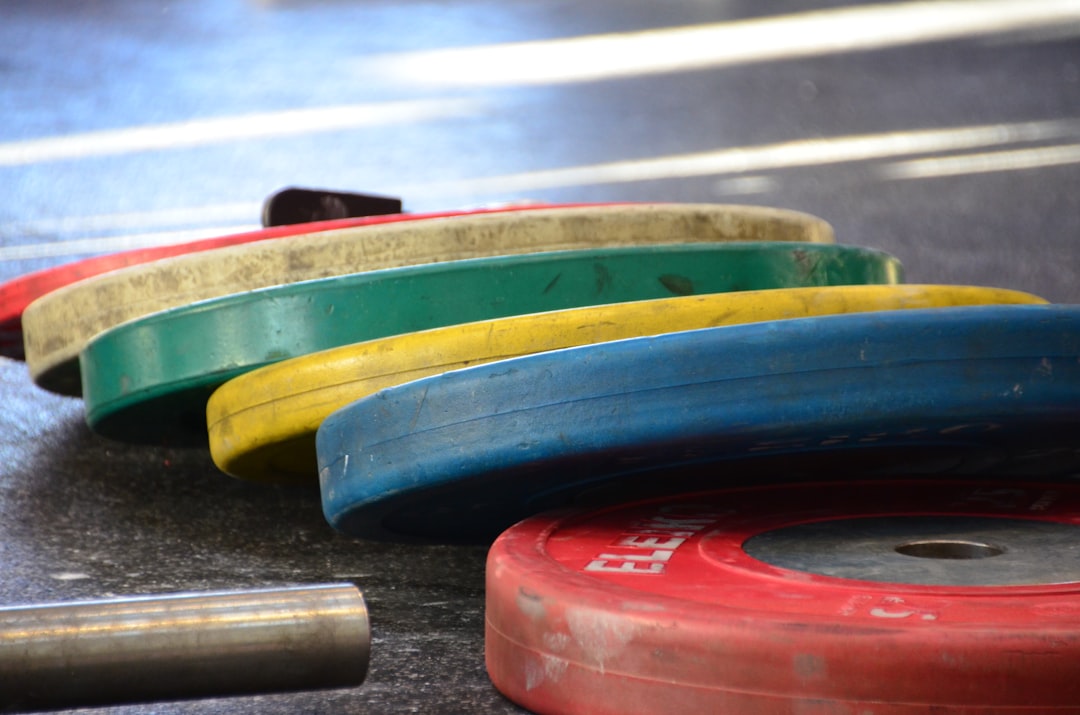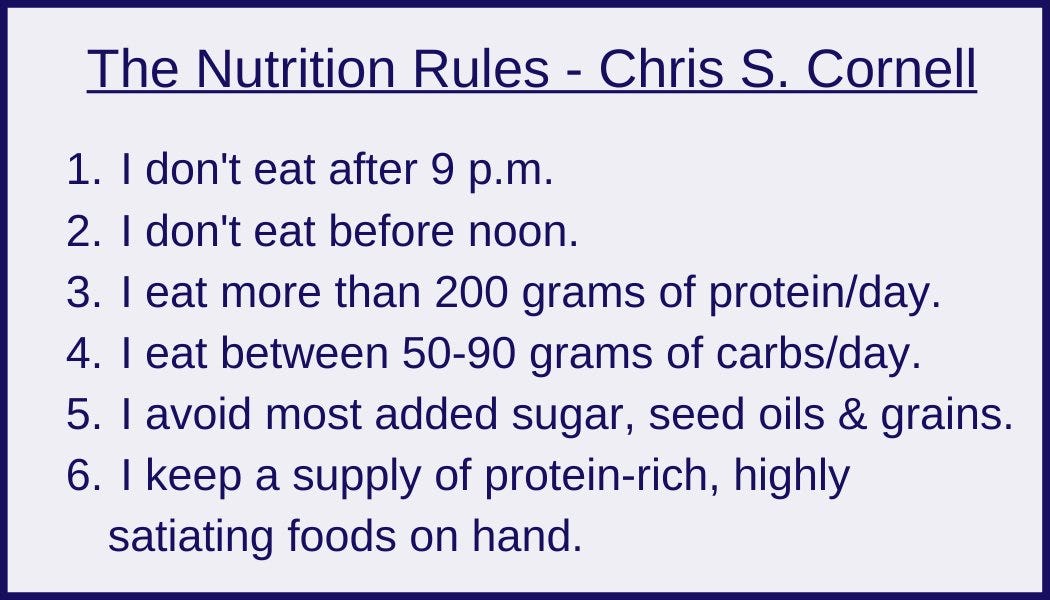The 'Fit After 40' Playbook
Strategies and tactics for staying fit in middle age

👋Hello Friends - I’ve got something for you today that’s a bit more tactical than usual. I wrote a Twitter thread on ‘Fitness after 40’ this week that went semi-viral. Based on the popularity of that piece, I decided to re-purpose it as this week’s newsletter.
I hope you enjoy! - Greg
Most people fail to keep up with their health & fitness after 40. I’m trying hard not to be one of those people. I spend a lot of time reading, listening, learning and experimenting with fitness, nutrition, supplements and sleep.
Below is the best of what I’ve learned to-date. Take what’s helpful to you, leave the rest. And let me know what you agree with… and what you don’t.
The Fit After 40 Playbook
First of all, let's level-set on the goal. Sure we'd love to be rocking six-pack abs, chiseled pecs & toned arms to the embarrassment of the rest of the over-40 crowd at the community pool... Those are great (& possible), but after 40, they are "nice to haves."
In middle age, our fitness goals are less about vanity and more about utility. What do we really need to do?
• Avoid injury
• Prevent disease
• Build functional (full body) strength
• Maintain high levels of energy
Six packs are great. But these are more important now.
So how do we get there? By getting the basics right and being smart about our tactics.
In this article, I'll cover 4 areas of focus with specific recommendations for each.
They are:
• Exercise
• Nutrition
• Supplements
• Sleep
Let's dive in.
Exercise
Just do it. It ALMOST doesn't matter what it is. But multiple times per week, we need to:
• Sweat profusely
• Be completely out of breath
• Use our muscles to the point of soreness
If this doesn't sound like you, I’m sorry to say it, but you're not working hard enough.
However… exercise doesn't have to SUCK.
It does, though, need to be sustainable. To make that happen, look for activities that:
• You actually enjoy (tennis, weightlifting, Peloton, whatever).
• Have some community aspect
• Allow you to track your progress
Michael Girdley, who I recently interviewed on the Intentional Wisdom podcast, is impressively fit in his late-40s. He told me about how he keeps it sustainable:

Girdley brings up variety and stretching - two extremely important concepts. When it comes to variety, we're too old to hammer the same activity day in and day out. If we want to be functionally strong - aka able to do random sh*t without injury - we need variety.
Here's what a week with variety built in can look like:
Sun - Full body strength class
Mon - HIIT ride / run
Tues - Weightlifting
Weds - Recovery / long walk or light run / Tennis
Thurs - Full body strength class
Fri - Endurance ride / run
Sat - Weightlifting
Obviously yours will look different. The key is stressing your body daily. But don't skip the weightlifting/strength-training. If you're just running or just playing tennis, you're not going to build that full body strength that is so critical to injury prevention.
For working out your entire body, I recommend Peloton's 30min full body strength classes. They have a massive library of them and they only require a couple of dumbbells. But that's just one option. There is so much great instruction available for free on YouTube and other places.
For weightlifting... keep it simple:
• Benchpress
• Squats
• Deadlifts
• Lawnmower rows
• Overhead press
Move quickly from one exercise to another. Write down how many reps you're able to do. Seeing your progress from week to week is an incredible motivator.
And if you can't get to the gym, you can do an incredible amount just with bodyweight exercises:
• My favorite quick workout is 100 push-ups - don't get off the floor until you're done. Aim for <10 mins to start.
• Get a pull-up bar (can start with assisted)
• Air squats
When you're done working out, don't forget to STRETCH. Seriously, once you hit 40, you can no longer ignore this. It may be as important as the workout itself. I'm obviously a Peloton fan, and I like their offering here, too. A full library of 10-min full body stretches.
Not only does stretching target all of those specific muscle groups that you just worked out and help to jumpstart your recovery, but it also signals to your nervous system that the "threat" is over... it is time to relax. This transition is critical.
Finally... get yourself a massage gun. After 40, the reality is that we're just going to have more soreness & nagging areas of tightness. This luxury is worth it. Find a partner & enjoy "gunning" each other regularly. It's a great way to shorten recovery times.
Nutrition
When it comes to nutrition, you already know what to do. You just need to be more intentional about it.
• Cut WAY back on the highly processed carbs
• Up the amount of protein (most don't consume nearly enough)
• Get laser-focused on eating REAL food that is naturally occurring
On the carbs & protein. I have learned a lot from Chris S. Cornell aka @BiggestComeback on Twitter. His approach to creating "Nutrition Rules" is powerful. Your target #'s will look different than his (200g of protein is a ton!) but having a framework like this can be extremely effective. Using an app like MyFitnessPal or Carb Manager can help you actually track this, but as Girdley recently told me, just writing down what you eat every day can get you 90% of the way there.
Cornell is also a proponent of intermittent fasting. It's an effective way to:
• More intentionally control what you're putting into your body (& when, which can be surprisingly impactful)
• Give your digestive system a regular break, which has multiple benefits
I personally fast 5-6x/week and it does not feel like a sacrifice to not eat between 8pm and 11am, which is my window of choice. @hubermanlab has a superb episode on intermittent fasting which is a must-listen for anyone considering this tactic.
We can't discuss nutrition without discussing alcohol. Despite its social benefits (and in fairness, I do believe there are some), alcohol:
• Is a motivation killer
• Leads to other bad nutrition choices
• Wrecks our sleep and recovery
It is worth considering cutting WAY back.
Recently, I’ve been seeing some of the smartest, most productive people in my network quit alcohol completely or massively cut back on it. When the smartest people I know start doing something, I start paying attention.
I currently have a “no more than 3 drinks ever” rule but am always flirting with giving up alcohol completely like I did back in 2018.
If you’re considering cutting back, the good news is that non-alcoholic beers (and even spirits) have gotten MUCH better in recent years. My favorite is Athletic Brewing beers. Check ‘em out.
Supplements
And that brings us to supplements. Okay, this one is controversial and I am no doctor so please take this for what it is... one guy with a newsletter’s views. But let me tell you what I use based on learnings from the smartest people I pay attention to in this space. Here’s the list:
AG1 from @AthleticGreens We need a baseline. For me & many others, that "nutritional insurance" comes from AG1. It's got all the vitamins, nutrients, pre/probiotics you need in one serving. I spoke w/ Athletic Greens COO, Kat Cole, in detail about all things AG1. Check out that conversation here.
Magnesium - It can have a wide variety of benefits from improved sleep to better memory, focus and cognitive performance. I take 144mg of Magnesium L-Threonate (Life Extension) before bed every night. Thanks Dr. Andrew Huberman for this rec.
L-Theanine - Another @hubermanlab recommendation. Theanine is not necessarily a sleep aid but it is associated with an increased sense of calm and relaxation. I take 200mg (L-Theanine, Suntheanine) before bed.
Salt/Electrolytes/B-vitamins - For those on low-carb/keto diets, or those losing fluid/salt from exercise/living in warmer climates, etc. an extra boost here can be powerful. I take 1 (Max Keto Electrolytes, Zeal Naturals) every few days as needed. Good for headaches, too.
Creatine - This may be the most controversial thing in this article but creatine has been shown to promote:
• Lean muscle growth
• Shorter recovery times
• Improved cognitive function
People that I respect - whether it's for their personal results, or their clinical/research-based expertise, seem to agree on creatine being safe & effective, including:
• @hubermanlab
• @FitFounder
• @BiggestComeback
• @DrAndyGalpin


For additional comfort on safety, I recommend reading both the Mayo Clinic and Cleveland Clinic's assessments. Both deem it to be safe. I recently started taking 5g/day of Creatine Monohydrate (Thorne). Will keep you posted on the results I see.
Finally, this bring us to…
Sleep
The mother of all recovery methods. Everything else we do depends on the quality of our sleep, so we need to nail it.
I used to struggle with sleep, but these tactics have helped immensely:
• Same bed time, same wake-up time every day (even on weekends)
• Natural light within 1 hour of waking
• Intense exercise during the day
• No caffeine after noon
• Very limited alcohol
• Reading fiction or history before bed
• Magnesium/Theanine supplements
And while I think you can establish a great sleep routine without technology, two tools have helped me:
• @eightsleep - regulates bed temperature & monitors key metrics like HRV
• @whoop - sophisticated metrics (also including HRV) to assess sleep performance
If you're not familiar with HRV (Heart Rate Variability), it is one of the best measures of both short and long-term health available at mass-market scale. I wrote more about this metric here.
One final note on sleep, I would highly caution against regular use of sleeping pills like Ambien. Relying on medication like this is a bad path to go down—partially because it’s not “real” sleep you get from them. It’s sedation. And that’s not what your body needs to truly recover and regenerate. I’ve been in bad cycles like this before. The way I’ve gotten out is by relying on the tactics I’ve outlined above. I hope they can help you, too.
And that's it... health and fitness after 40.
Please remember that I am no expert on any of this and you should rely on your own research and/or your doctor’s advice for your own personal plan.
This is what I’ve learned from experts like:
• @hubermanlab
• @FitFounder
• @DrAndyGalpin
& some of my friends who take their fitness seriously like:
• @BiggestComeback
• @Jon_Finkel
• @jbonhotal
• @girdley
Let me know what you think. Is anything I’ve said way off base from your perspective? I certainly don’t claim to have it all figured out. So let me know what I’m missing.
And finally, if you’re not already listening to the Intentional Wisdom podcast, I’d love for you to check that out. Many of the people mentioned in this article have been podcast guests already and I continue speak regularly with experts on the topics discussed in this article. I’d love for you to listen and let me know what you think.
That’s it for this week. But before you go…
Content Diet
The Greatest Life Hacks in the World (For Now) - Man, I am such a sucker for small bits of sage life advice and this article from David Brooks has some absolute gems. If you don’t have a NY Times subscription, Sahil Bloom re-posted a bunch of them here. And shoutout to Sahil for bringing this article to my attention.
That’s it for today. I appreciate you reading.
See you in two weeks!
— Greg



